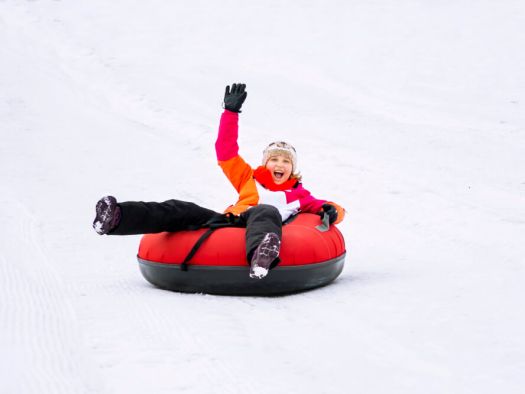Black Bears in the Smokies
Looking to see some wild life on your vacation? While hiking in the Smokies, there's a good chance of spotting deer, birds, & black bears!
Bears inhabit all areas of Smoky Mountain National Park. Biologists estimate that roughly 1,500 bears live in the park. This equals a population density of approximately two bears per square mile. At one time, the black bear's range included most of North America except the extreme west coast. However loss of habitat has resulted in a significant reduction in this range.
Black bears in the Smokies are black in color, but in other parts of the country they may be brown or cinnamon. They may be six feet in length and up to three feet high at the shoulder.Like humans, black bears are omnivores. Plant materials such as berries and nuts make up approximately 85% of their diet. Insects and animal carrion provide valuable sources of protein for bears. Bears have color vision and a keen sense of smell. In addition, they are good tree climbers, can swim very well, and can run 30 miles per hour.
What should you do if you do spot a bear? Bears in the park are wild and their behavior is sometimes unpredictable. Although extremely rare, attacks on humans have occurred, inflicting serious injuries and death. Treat bear encounters with extreme caution and follow these guidelines:
If you see a bear remain watchful. Do not approach it. If your presence causes the bear to change its behavior (stops feeding, changes its travel direction, watches you, etc.)-you're too close. Being too close may promote aggressive behavior from the bear such as running toward you, making loud noises, or swatting the ground. The bear is demanding more space. Don't run, but slowly back away, watching the bear. Try to increase the distance between you and the bear. The bear will probably do the same.
If a bear persistently follows or approaches you, without vocalizing, or paw swatting, change your direction. If the bear continues to follow you, stand your ground. If the bear gets closer, talk loudly or shout at it. Act aggressively to intimidate the bear. Act together as a group if you have companions. Make yourselves look as large as possible (for example, move to higher ground). Throw non-food objects such as rocks at the bear. Use a deterrent such as a stout stick. Don't run and don't turn away from the bear. Don't leave food for the bear; this encourages further problems.
Most injuries from black bear attacks are minor and result from a bear attempting to get at people's food. If the bear's behavior indicates that it is after your food and you're physically attacked, separate yourself from the food and slowly back away.
If the bear shows no interest in your food and you're physically attacked, fight back aggressively with any available object--the bear may consider you as prey! Help protect others, report all bear incidents to a park ranger immediately. Above all, keep your distance from bears!
The black bears of the Smokies are beautiful creatures and an incredible part of the scenery just take precautions but remember over all, you're in their home so be respectful as such. For a full article on black bears the tips above,and more information about bear safety visit http://www.nps.gov/grsm/learn/nature/black-bears.htm
Bears inhabit all areas of Smoky Mountain National Park. Biologists estimate that roughly 1,500 bears live in the park. This equals a population density of approximately two bears per square mile. At one time, the black bear's range included most of North America except the extreme west coast. However loss of habitat has resulted in a significant reduction in this range.
Black bears in the Smokies are black in color, but in other parts of the country they may be brown or cinnamon. They may be six feet in length and up to three feet high at the shoulder.Like humans, black bears are omnivores. Plant materials such as berries and nuts make up approximately 85% of their diet. Insects and animal carrion provide valuable sources of protein for bears. Bears have color vision and a keen sense of smell. In addition, they are good tree climbers, can swim very well, and can run 30 miles per hour.
What should you do if you do spot a bear? Bears in the park are wild and their behavior is sometimes unpredictable. Although extremely rare, attacks on humans have occurred, inflicting serious injuries and death. Treat bear encounters with extreme caution and follow these guidelines:
If you see a bear remain watchful. Do not approach it. If your presence causes the bear to change its behavior (stops feeding, changes its travel direction, watches you, etc.)-you're too close. Being too close may promote aggressive behavior from the bear such as running toward you, making loud noises, or swatting the ground. The bear is demanding more space. Don't run, but slowly back away, watching the bear. Try to increase the distance between you and the bear. The bear will probably do the same.
If a bear persistently follows or approaches you, without vocalizing, or paw swatting, change your direction. If the bear continues to follow you, stand your ground. If the bear gets closer, talk loudly or shout at it. Act aggressively to intimidate the bear. Act together as a group if you have companions. Make yourselves look as large as possible (for example, move to higher ground). Throw non-food objects such as rocks at the bear. Use a deterrent such as a stout stick. Don't run and don't turn away from the bear. Don't leave food for the bear; this encourages further problems.
Most injuries from black bear attacks are minor and result from a bear attempting to get at people's food. If the bear's behavior indicates that it is after your food and you're physically attacked, separate yourself from the food and slowly back away.
If the bear shows no interest in your food and you're physically attacked, fight back aggressively with any available object--the bear may consider you as prey! Help protect others, report all bear incidents to a park ranger immediately. Above all, keep your distance from bears!
The black bears of the Smokies are beautiful creatures and an incredible part of the scenery just take precautions but remember over all, you're in their home so be respectful as such. For a full article on black bears the tips above,and more information about bear safety visit http://www.nps.gov/grsm/learn/nature/black-bears.htm





